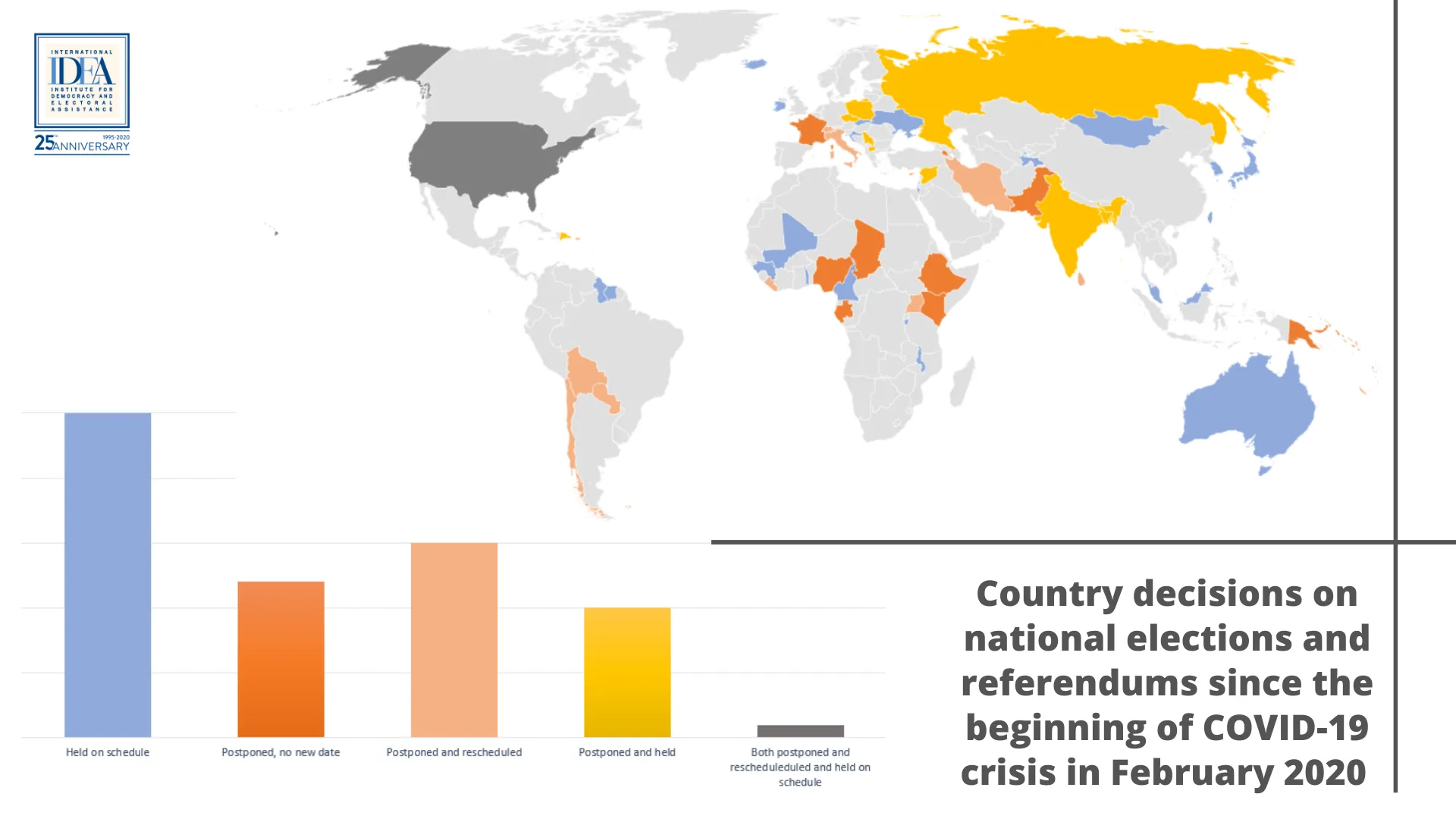Risk mitigation measures for national elections during the COVID-19 crisis

Este artículo está disponible en Español.
More than 90 countries and territories across all the continents had to decide whether to hold or postpone national and sub-national elections and referendums since the end of February, when the COVID-19 crisis became global, according to the Global overview of the impact of COVID-19 on elections developed by the International Institute for Democracy and Electoral Assistance (International IDEA).
At least 63 countries had national elections or referendums scheduled for the first part of 2020 and the decisions ranged from holding elections as initially planned to postponing, and more recently to holding elections that had been initially postponed.
The presidential elections in Poland, the parliamentary elections in Singapore, the presidential and legislative elections in the Dominican Republic, and the Malawi presidential rerun are four recent examples of the more than 30 featured case studies that were developed as part of International IDEA’s initiative to track and analyse the impact of the novel coronavirus disease on elections worldwide.
Risk mitigation measures were introduced by many of the countries that held elections amid the novel coronavirus disease outbreak, with different outcomes in terms of both the turnout, as well as the posterior evolution of COVID-19 cases.
Voter turnout and the evolution of COVID-19 cases post-election day
The presidential elections in Poland saw a nearly all-time high turnout for the first round – with both postal and in-person voting options available. Only one month before it had gone down in history as the first country with zero turnout elections. The latter was the consequence of the failed attempt of the government to hold the elections exclusively by mail, as a measure to counter the COVID-19 risks.
For both rounds of the presidential elections in Poland (28 June and 12 July 2020), a range of health protection measures were implemented at the polling stations. Although the COVID-19 cases increased, that didn’t lead to a significant spike. The voter turnout for the second round (12 July 2020) was even higher, and the voters were requested to wear masks and gloves, maintain distance, use hand sanitizer and bring their own pens.

Voting is compulsory in Singapore. For the parliamentary elections (10 July 2020), preventive safety measures at polling stations were implemented, such as temperature screening, social distancing, masks and gloves, staggered voting times, based on the South Korean electoral experience during COVID-19, as well as mobile polling teams. Long queues in several polling stations resulted as a consequence of implementing the safety measures and due to the face that voters did not respect their allotted times.

In the case of the presidential and legislative elections in the Dominican Republic (5 July 2020), the safety measures for the voting day called for mandatory use of face masks, disinfection of voting materials, and social distancing. Despite these efforts, the Organization of American States (OAS) reported long lines in front of polling centers and a lack of compliance with the protocols in place. The Dominican Republic was one of the first countries in Latin America and the Caribbean region to hold elections during the COVID-19 pandemic and although lower than in previous elections, the turnout was considered high given the health context.

Malawi held the rerun of the 2019 presidential elections on 22 June 2020. The electoral commission recommended the voters to bring their own pens and to practice social distancing, while the electoral officials had to wear masks and other protection equipment. Media reported that the guidelines were not respected in terms of keeping a safe distance between voters and few people used masks. At the time of elections, Malawi counted a total of 749 COVID-19 cases, with 19 reported on the voting day.
The turnout was lower compared to the 2019 presidential elections.

For the latest information and analysis related to COVID-19 and elections from across the world, check regularly the Global overview of the impact of COVID-19 on elections developed by the International Institute for Democracy and Electoral Assistance (International IDEA).





